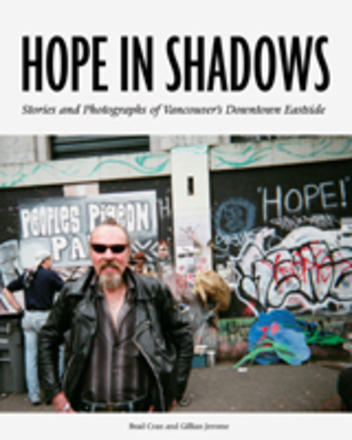
Hope in Shadows
Stories and Photographs of Vancouver's Downtown Eastside
Description
Winner of the City of Vancouver Book Award
Shortlisted for the Roderick Haig-Brown Regional Prize (BC Book Prizes)
Longlisted for the George Ryga Book Award for Social Issues
Excerpted in The Globe and Mail and The Vancouver Sun and on TheTyee. ca
Residents of Vancouver's Downtown Eastside are not bound by poverty or addiction but rather driven by a sense of community, kinship, and above all, hope. For each of the past five years, Pivot Legal Society's annual Hope in Shadows photography contest has empowered residents of Vancouver's Downtown Eastside by providing them with 200 disposable cameras to document their lives--thus giving them an artistic means to enter the ongoing and often stormy dialogue over the place they call home. Since the contest's inception, DTES residents have taken over 20,000 images of their neighbourhood. Working with this archive, Brad Cran and Gillian Jerome have collected the personal stories behind these stunning photographs.
Hope in Shadows offers readers an intimate and honest look at what it really means to live in Canada's poorest neighbourhood. The result is not at all bleak, but rather is full of grace, dignity, and plain simple truths that put a human face on the single most misunderstood community in Canada. This, then, is its story: about First Nations people who survived the residential school system; sex workers whose poor treatment at the hands of authorities precipitated the murder of dozens of women; those who cope with addiction and inadequate living conditions; those who overcome loss and search for loved ones; and the transformative power of hope and forgiveness.
In surprising and astounding ways, Hope n Shadows will not only change the way you think about the Downtown Eastside and other impoverished neighbourhoods; it will also change your view of society as we know it, and of those who are forced to live in its shadows.
A co-publication with Pivot Legal Society, a nonprofit legal advocacy organization located in Vancouver's Downtown Eastside. Its mandate is to take a strategic approach to social change, using the law to address the root causes that undermine the quality of life of those most on the margins. Pivot believes that everyone, regardless of income, benefits from a healthy and inclusive community where values such as respect and equality are strongly rooted in the law.
Awards
- Winner, City of Vancouver Book Award 2008
- Short-listed, Roderick Haig-Brown Regional Prize 2009
Reviews
An honest portrayal of what it's like to live on Canada's poorest streets.
- Where Vancouver
-Where Vancouver
Although coverage of the Downtown Eastside may be increasing, I don't think anything that has been written about the area has really captured its essence as well as the book Hope in Shadows has. ... [It] should be essential reading for every Vancouverite. ... This book, and groups such as Pivot Legal Society, are essential to our understanding of this often neglected corner of our city.
- re:place
-re:place Magazine
This book is not just about the Downtown Eastside, though its pages are alive with photographs and stories of its residents. More than anything, it's proof of the compassion, resistance and love that make us human. A powerful valentine to a heartbroken city.
- The Tyee
-The Tyee
A sense of kinship and peer support, above all else, comes through in the 32 intimate, engaging stories in Hope in Shadows. ... The stories crackle with energy, individuality, and often a determination to be heard.
- Georgia Straight
-Georgia Straight
The result is a collective self-portrait, one that does indeed show the vareity so essential to the neighbourhood's view of itself.
- Seven Oaks
-George Fetherling, Seven Oaks
These images and stories provide opportunities for real insight into what people in this community are interested in, what they value, where they come from and what they continue to struggle with. ... Hope in Shadows provides a complete record of individual lives--one that succeeds in "placing individuals within a context that reveals as much about other members of society as it does about them. " In so doing, it promotes the dignity of the individual and fosters greater respect, understanding and compassion for this community.
- Rabble.ca
-Rabble. ca